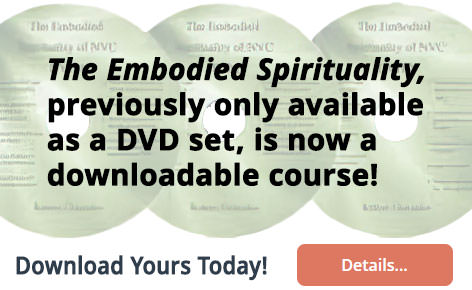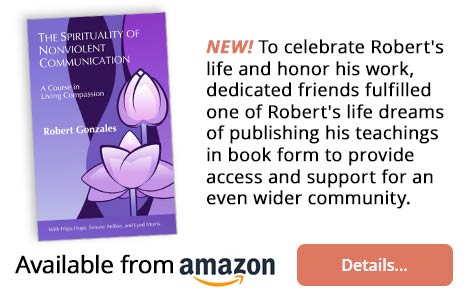

Welcome to the Robert Gonzales Training Legacy. Here you can learn more about Robert and the powerful teachings he dedicated his life to. NVC Academy is proud to house and share with you the complete body of his life's work. We invite you to explore, learn, and help keep his legacy alive!
Robert's passion was in the spirituality of the Nonviolent Communication (NVC) process. He saw NVC both as a process that helps people connect more authentically with themselves and others, and as a spiritual practice and way of living. The worldwide NVC community mourned when Robert died in 2021. He left behind a legacy of work that emerged from a lifetime of inquiry into the intersection between spirituality and human communication. More about Robert.
Trainer Tip
1 - 2 minutes
Trainer Tip: One of the swiftest ways to close our hearts is having judgmental thinking or looking to get our way. How open are you when you’re in this mode? The goal in peaceful living is to approach our relationships with an open heart. Start conversations today with an intention to connect with other people.
Details...Trainer Tip
1 - 2 minutes
Trainer Tip: When we have no hope of a conversation working out, our attitude towards the situation can contribute to our lack of success. Instead, start conversations that might be challenging with the intention of success. This can shift the energy immediately toward it. This doesn’t guarantee success, but can increase its chances.
Details...Video
44 minutes
How do you carry on a conversation when someone’s comment has had an impact on you? And what happens when two intentions clash because of different perspectives? Here’s Roxy’s powerful, common sense approach.
Details...Learning Tool
1-2 minutes
This one page colour handout illustrates the focus options or intention options for connection: empathy (verbal and non-verbal), self expression, and self connection (opening our heart to self and/or others). It also offers some suggestions for how to say these things to self and others.
Details...Trainer Tip
1 - 2 minutes
Trainer Tip: Today, when you tell yourself that you "have to" or "should" do something, notice what you feel and experience - is it a sense of duty, obligation, guilt, shame, overwhelm, constriction, heaviness? Then consider the underlying needs you are trying to meet with the activity. This can shift the purpose and intention with an energy that motivates our actions can bring empowerment and joy to our lives.
Details...Practice Exercise
4 - 6 minutes
Connecting with self and other is key to care and creativity. Before dialogue connect with your intention and needs for being with grief, fear or pain, and empathy. Dialogue when you're both rested, fed, and have spaciousness. Start by expressing care and desire to find mutually satisfying solutions. To deepen connection you may repeat what you hear and ask the other person to do the same.
Details...Practice Exercise
4 - 6 minutes
When someone's behavior costs us, we may attempt to negotiate as much as possible. After some rounds of this, if there's no change we may reach a tolerance limit. So we may set a boundary for self care and clarity about what's unworkable. But depending on intentions and the way its said, this may or may not be a punishment to get even. Here, clarity about intentions, feelings, needs, actions and dialogue may support us.
Details...Video
5 minutes
Listen to Miki Kashtan explain the importance of intention in developing our skill at creating solutions that work for everyone. Neither fighting nor giving up are qualities of nonviolence, but rather a fierce determination to hold the needs of all parties may arise.
Details...Article
23 - 34 minutes
Society gives us short-sighted explanations about human nature, life and what’s (un)changeable. The coronavirus pandemic is disrupting that explanation. Our current social order upholds impoverishment, police brutality, and is leading us towards our extinction. Change begins with people mobilizing resources towards a vision that holds systemic care for all, plus engages shared risk and collective action towards that vision.
Details...Article
3 - 5 minutes
When someone responds with painful sarcasm, criticism, or dismissal you can respond with empathy, or with clarity about your intention, need and request. If you're unable to do this, later you can privately write what they said, identify the feelings and needs of both of you, then write possible responses. This can help you remember to stay with your intention and what’s true for you without getting caught in defensiveness or reactivity.
Details...

